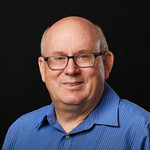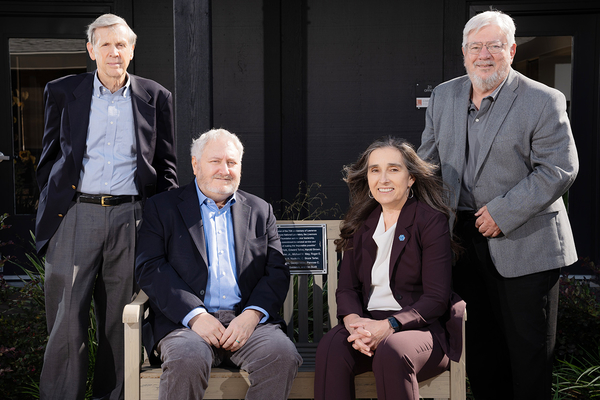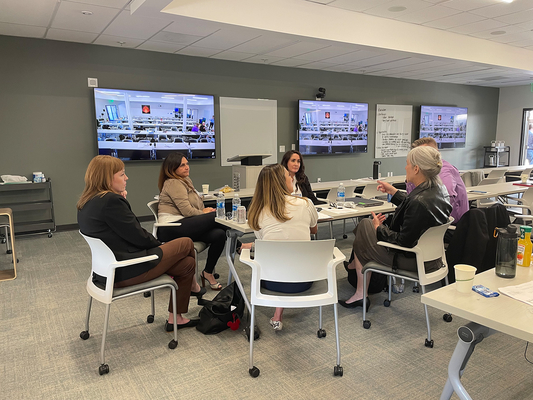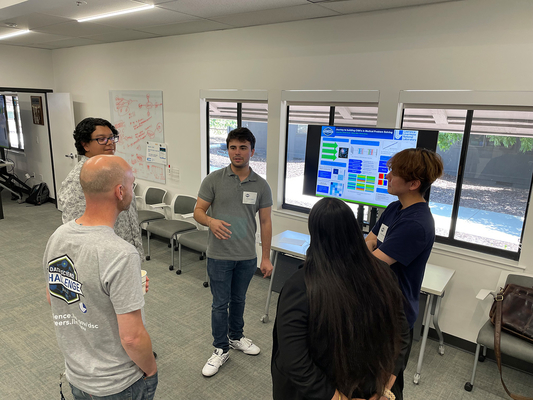UC-Livermore Collaboration Center connects people, expertise, technology
 (Download Image)
(Download Image)
University of California Livermore Collaboration Center at Lawrence Livermore National Laboratory.
Since it first opened its doors 16 months ago, the University of California Livermore Collaboration Center (UCLCC) has helped strengthen collaborations to address some of the UC system’s — and the nation’s — most pressing problems.
Located on the east side of the Laboratory across the street from the Discovery Center, UCLCC seeks to connect people, expertise and technology across UC’s three affiliated national labs, 10 campuses, five medical centers and the statewide Agriculture and Natural Resources program.
Through February 2024, it has hosted 120 events, with 3,200 in-person guests and 1,500 virtual attendees.
“What excites us most about those numbers is that about 70% of the programs at UCLCC involve multiple UC campuses and national laboratories,” said Camille Bibeau, executive director for partnerships and outreach for UC national laboratories within the UC Office of the President, who assumed the position after more than three decades as a scientist at LLNL. “We believe strongly in UCLCC’s potential to help the UC community take full advantage of the world-class resources and brainpower our system possesses – and we are already seeing that potential bear fruit.”
A bold vision comes to life
“The collaboration center is the very highest-level expression of the University of California’s ideal of public service, learning and education,” said Cliff Shang, Lawrence Livermore National Laboratory’s director of infrastructure. “As a venue, it’s highly attuned for scientific and technical collaboration. The design and layout reflect well on the leadership who have realized a powerful vision.”
Shang’s comments came after hosting a three-day meeting in June 2023 at UCLCC for the Streamlined Project Execution, Acquisition and Recapitalization (SPEAR) group. The workshop brought together 80 key personnel, including 40 virtually, from the National Nuclear Security Administration (NNSA), the Department of Energy, Los Alamos and Sandia national laboratories, five other nuclear security enterprise sites and the construction industry to learn how to streamline construction across the NNSA complex.
LLNL materials scientist Thomas Voisin, of the Lab’s Materials Science Division, hosted a three-day workshop in March 2023 at UCLCC that focused on advanced engineering materials.
It attracted about 70 scientists and engineers from four UC campuses (Davis, Berkeley, UCLA and Santa Barbara), NASA Ames, the Jet Propulsion Laboratory, Los Alamos and Sandia national laboratories, the Naval Research Laboratory and Johns Hopkins University.
“It was a very good workshop and the feedback we received also was excellent,” Voisin said. “The location worked out well…we were within walking distance of the Advanced Manufacturing Laboratory.”
The center’s advantages extend beyond scientific collaborations and a convenient and welcoming location; it’s also a place for faculty to mentor students and foster a pipeline of outstanding young talent.
Consider a July meeting when undergraduate and graduate students from UC Merced and UC Riverside worked alongside LLNL staff mentors for two weeks on a data science problem involving prediction of health conditions from cardiac data.
“It was exciting to see the students enthusiastically explaining their projects to Data Science Summer Institute students as well as LLNL staff and management,” said LLNL computer scientist Brian Gallagher. “The students were so engaged every day. Everyone made themselves at home and seemed comfortable and productive at UCLCC.”
Other UCLCC events have included the UC Irvine Nuclear Science Workshop, which brought together leadership from the five Seaborg Institutes in the Department of Energy laboratories and 20 students and faculty from UCI to introduce them to opportunities at the UC national laboratories, as well as a three-day meeting of the National Lab Entrepreneurship Academy with UC Davis.
“I think the UC-Livermore Collaboration Center is the university’s best-kept secret,” said Karen Block, director of industry relations for the UC Davis Department of Viticulture and Enology, whose faculty met at UCLCC with local Livermore-area growers in November 2023 to discuss recent research. “The technology worked seamlessly; the room was well-lit and comfortable; the outdoor courtyard was perfect for lunch … it was a great place for both technical presentations and informal group interactions.”
Block indicated that she would love to host another similar event at the UCLCC and would like to see UC Davis faculty members collaborate with LLNL researchers to use computing and imaging capabilities.
The collaboration center should not be viewed as a conference or event space, Bibeau noted, but rather as a venue that focuses on developing sustained collaborations between the UC campuses, its medical centers and the national labs.
“Everything about the UCLCC is about fostering the success of the people who meet here. We’re fully invested in the success of the groups whom we host at the center,” Bibeau said. “Almost every time we host a meeting, the people enjoy their interactions so much that they linger until we close down the building.”
A multi-campus multi-lab center, UCLCC combines expert staff with intuitively designed facilities that include a breakout space, social space, state-of-the-art Zoom Room and adaptable seating configurations.
A focus on fostering productive collaborations
UCLCC programs tend to emphasize three technical areas: high-energy-density science; materials and manufacturing; and artificial intelligence, machine learning and data science.
“That said, anyone in the UC system and national labs is welcome to request use of the space for programs that tackle important topics,” Bibeau said.
“And regardless of the topic, our goal is to help each of our hosts take their collaborations to new levels of engagement with minimal distractions,” said Garren Weiss, UCLCC administrative operations coordinator. “We’re excited because programs are coming back and already reserving space for 2025,” Bibeau said. “This affirms for us that we have already helped numerous programs achieve new levels of engagement.”
To request use of UCLCC, contact garren.weiss [at] ucop.edu (Garren Weiss) at (510) 987-0802.
Contact
 Stephen Wampler
Stephen Wampler
[email protected]
(925) 423-3107







